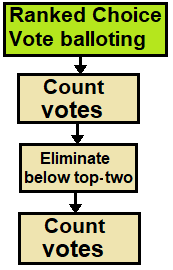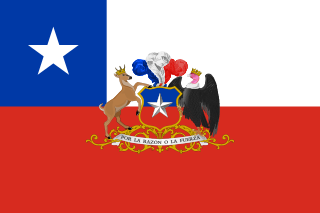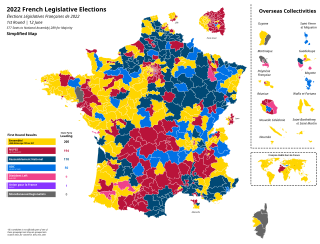
The two-round system (TRS), also known as runoff voting, second ballot, or ballotage, is a voting method used to elect a single candidate, where voters cast a single vote for their preferred candidate. It generally ensures a majoritarian result, not a simple-plurality result as under first past the post. Under the two-round election system, the election process usually proceeds to a second round only if in the first round no candidate received an absolute majority of votes cast, or some other lower prescribed percentage. Under the two-round system, usually only the two candidates who received the most votes in the first round, or only those candidates who received above a prescribed proportion of the votes, are candidates in the second round. Other candidates are excluded from the second round.

Elections in Chile are held nationwide, including the presidency, parliament, regional offices, and municipal positions. Chilean citizens and foreign residents with legal residency of at least five years, who are 18 years or older on election day, are eligible to vote. Previously, voting was voluntary, but since 2023, it has become compulsory.

France is a unitary semi-presidential republic with a bicameral legislature. Public officials in the legislative and executive branches are either elected by the citizens or appointed by elected officials. Referenda may also be called to consult the French citizenry directly on a particular question, especially one which concerns amendment to the Constitution.
At a national level, Greece holds elections for its legislature, the Hellenic Parliament.

The Dominican Republic is a unitary state with elected officials at the national and local levels. On a national level, head of state, the President, is elected directly by the people. The national legislature, the Congress of the Republic, is divided into two chambers: the Chamber of Deputies and the Senate. There are also elected offices at the local level. It is estimated that across the whole country, over four thousand offices are filled in every electoral cycle.

Elections in Lithuania are held to select members of the parliament, the president, members of the municipal councils and mayors, as well as delegates to the European Parliament. Lithuanian citizens can also vote in mandatory or consultative referendums.

Legislative elections were held in France on 10 June and 17 June 2007 to elect the 13th National Assembly of the Fifth Republic, a few weeks after the presidential election run-off on 6 May. 7,639 candidates stood for 577 seats, including France's overseas possessions. Early first-round results projected a large majority for President Nicolas Sarkozy's Union for a Popular Movement (UMP) and its allies; however, second-round results showed a closer race and a stronger left. Nevertheless, the right retained its majority from 2002 despite losing some 40 seats to the Socialists.

The 2006 Italian presidential election was held on 8–10 May 2006. The result was the election of Giorgio Napolitano, the first time a former member of the Italian Communist Party had been elected to the presidency of the Italian Republic.
The exhaustive ballot is a voting system used to elect a single winner. Under the exhaustive ballot the elector casts a single vote for their chosen candidate. However, if no candidate is supported by an overall majority of votes then the candidate with the fewest votes is eliminated and a further round of voting occurs. This process is repeated for as many rounds as necessary until one candidate has a majority.

The contingent vote is an electoral system used to elect a single representative in which a candidate requires a majority of votes to win. It is a form of preferential voting. The voter ranks the candidates in order of preference, and when the votes are counted, the first preference votes only are counted. If no candidate has a majority of the votes cast, then all but the two leading candidates are eliminated and the votes received by the eliminated candidates are distributed among the two remaining candidates according to voters' preferences. This ensures that one candidate achieves a majority and is declared elected.

The President of Chile, officially known as the President of the Republic of Chile, is the head of state and head of government of the Republic of Chile. The president is responsible for both government administration and state administration. Although its role and significance have changed over time, and its position and relations with other actors in the national political organization have also evolved, it remains one of the most prominent political offices in the country. It is also considered one of the key institutions that form the "Historic Constitution of Chile," and is crucial to the country's political stability.

The Val-de-Marne's fifth constituency is a French legislative constituency in the Val-de-Marne département.

Presidential elections were held in Mongolia on 26 June 2017. Incumbent President Tsakhiagiin Elbegdorj, first elected in 2009 and re-elected in 2013, was constitutionally barred from running for a third term. For the first time, no candidate received a majority of the vote in the first round, forcing a run-off between Khaltmaagiin Battulga and Miyeegombyn Enkhbold on 7 July, brought forward from 9 July. The third-placed candidate Sainkhuugiin Ganbaatar refused to recognise the results after he missed out on the second round due to finishing 1,849 behind Enkhbold, claiming that an additional 35,000 votes had been added to the total and there had been fraud. His Mongolian People's Revolutionary Party demanded a recount of votes in Bayan-Ölgii.

The president of France is elected every five years.

Presidential elections were held in France on 10 and 24 April 2022. As no candidate won a majority in the first round, a runoff was held, in which Emmanuel Macron defeated Marine Le Pen and was re-elected as President of France. Macron, from La République En Marche! (LREM), had defeated Le Pen, leader of the National Rally, once already in the 2017 French presidential election, for the term which expired on 13 May 2022. Macron became the first president of France to win a re-election bid since Jacques Chirac won in 2002.
There have been eleven presidential elections in France since the establishment of the Fifth Republic in 1958.

Legislative elections were held in France on 12 and 19 June 2022 to elect the 577 members of the 16th National Assembly of the Fifth Republic. The elections took place following the 2022 French presidential election, which was held in April 2022. They have been described as the most indecisive legislative elections since the establishment of the five-year presidential term in 2000 and subsequent change of the electoral calendar in 2002. The governing Ensemble coalition remained the largest bloc in the National Assembly but substantially lost its ruling majority, resulting in the formation of France's first minority government since 1993.

The 2022 Italian presidential election was held in Rome between 24 and 29 January 2022. The president of Italy was elected by a joint assembly composed of the Italian Parliament and regional representatives. The election process extended over multiple days, culminating in incumbent president Sergio Mattarella being confirmed for a second term, with a total of 759 votes on the eighth ballot. This was the second most votes ever received by a presidential candidate. Mattarella became the second president to be re-elected, his predecessor Giorgio Napolitano being the first.

The 2022 Italian local elections were held in various Italian local communities on 12 June 2022, with a run-off round on 26 June. Local elections in Trentino-Alto Adige/Südtirol were held on 15 May, with a second ballot on 29 May, while local elections in Aosta Valley on 29 May, with a second ballot on 12 June. Elections took place in 980 out of 7,904 municipalities, 26 of which were provincial capitals. Mayors and city councils were elected for the ordinary five-year terms, lasting till 2027.

Presidential elections are scheduled to be held in France on 11 April 2027, with a second round on 25 April if required. The elections may be held earlier under exceptional circumstances, such as the resignation or death of the incumbent president Emmanuel Macron. Macron is not eligible to run in the 2027 elections, as he is limited to two consecutive terms in office.
























